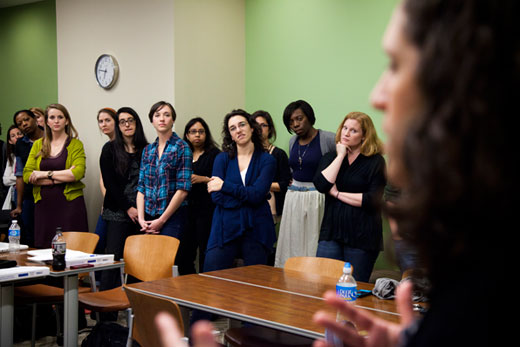Watching students squint at lessons projected upon a classroom screen, Sahar Salek felt a quick stab of self-recognition.
As a child, the Emory graduate student had suffered vision problems, but was afraid to tell adults she couldn't see in the classroom. "I think kids don't often realize that something is wrong with their eyes, and instead think that something may be wrong with them as a person," Salek observes in a class blog for "Classroom to Community: Health Education in Action." The new course is offered this semester through an innovative collaboration between Rollins School of Public Health (RSPH) and Teach for America (TFA), a national teacher recruiting program for college graduates.
From vision screening access to eyeglass affordability, her observation connected to larger public health issues for Salek, a master's candidate in behavioral sciences and health education. "It definitely hit home," she says.
This semester, Salek joins 14 other Emory masters students in a professional development seminar that pairs future health educators with Atlanta public school teachers in a symbiotic partnership.
While Emory students are bringing health information into the schools, TFA teachers provide practical real-world classroom experience and mentorship, from help writing engaging lesson plans to one-on-one coaching.
For Michael Turgeon, a ninth grade biology teacher at Banneker High School and Salek's TFA partner, it's meant "an opportunity to work alongside graduate students to build on a shared passion for social justice to impact the health and education landscape here in Atlanta," he reports in the class blog.
For Salek, the experience offers a chance to "take in the entire atmosphere, how students respond to being taught, how they interact with the teacher," she says. '"It's one thing to learn about teaching and health through readings and a completely different thing to go into a classroom and see what it's like."
A desire for community outreach
Credit for the new seminar goes to Ariela Freedman, assistant research professor in Rollins School of Public Health and a TFA alum, who recalls her own years spent teaching in Chicago as "one of the best experiences of my life," she says.
Freedman knew other TFA alums at RSPH were looking for community engagement opportunities. In fact, RSPH had recently formed a partnership with TFA. Dubbed "ConnectEd4Health," the program initially focused on engaging TFA alumni at RSPH with current TFA members interested in health.
When Freedman's students pressed for more hands-on teaching experience, she pondered broadening the partnership. Creating a new course would offer health resources to public schools and skill-building, leadership and career development for RSPH students.
"It surprised me that in 21 years of existence, Teach For America had not had any large-scale partnerships with any school of public health," says Freedman.
Working with Lauren LaMont of Metro Atlanta TFA, Freedman envisioned a class that could enhance health leadership training for TFA corps members, while helping Emory students become better educators - "a mixture of scholarship, observation, hands-on practice, and lots of reflection and discussion," Freedman says.
Class offers real-world lessons
To date, Classroom to Community is the largest initiative of the nascent ConnectEd4Health collaboration. With financial support from the RSPH offices of Leadership and Community Engaged Learning and Career Services, and the Office of University-Community Partnerships, the seminar launched in January with high student interest.
Thirty-seven graduate students applied, representing disciplines from behavioral sciences and health education to environmental health and theology. In the end, 15 were chosen and matched with TFA teachers selected through a similar application process.
Students meet for a two-hour class once a week at RSPH; teaching partners are invited as well, and many attend. The following week, students are out in Atlanta classrooms. Though only required to participate every other week, "I have some students in (schools) every week, some in there all day," Freedman says.
Real-world lessons abound. Once, while teaching a pre-K class about brushing their teeth, RSPH graduate student Lolly Beck-Pancer discovered most of the children didn't own a toothbrush. "She got her dentist to donate 30 toddler toothbrushes for a lesson on oral hygiene," Freedman says.
Brianna Keefe-Oates, a master's student in global health and former Peace Corps volunteer, finds the class offers the kind of teaching experience that she'll need this summer, when she plans to go to Paraguay to implement a pregnancy prevention curriculum.
"It's been great," she says. "When we're sitting in school, we have all these grandiose ideas, but in the classroom you have to think about all the little details and logistics that go into a lesson plan or to make sure all the kids are learning according to their different educational needs. It reminds me of the important details I need to think about."

